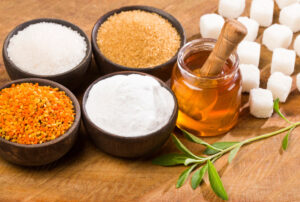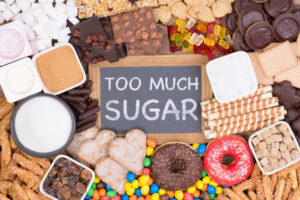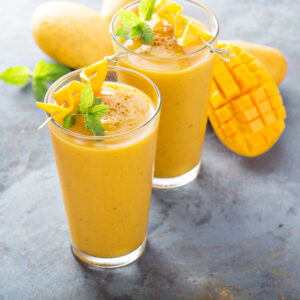Sugar - One of our biggest addictors
(updated 7/20/2024)
Having a desire for sugar is quite natural. We have built-in taste buds for salt, sugar, bitterness, sour, and fat.
But there are many sources of sugar.
The natural sugars found in whole plant foods such as dates and fruits promote health, while the added sugars found in refined, processed foods promote weight gain, inflammation, insulin resistance, diabetes, heart disease and other major illnesses.
How much sugar are we eating?
Most of the sugar Americans consume is hidden within processed foods, so people don’t even realize they’re eating it. Added sugars can be tricky to spot on labels because of the many types of sugar manufacturers can use. Here's a list of 56 of them, if you're interested.
The World Health Organization suggests getting no more than 5 percent of daily calories from sugar, or about 25 grams (6 teaspoons). The American Heart Association recommends women limit sugar consumption to 6 teaspoons (25 grams) per day and men limit to 9 teaspoons (36 grams) per day.
Those recommendations include ALL types of added sugars: brown sugar, maple syrup, agave syrup, honey, cane sugar, date sugar, coconut sugar, etc. As it turns out, it's the AMOUNT of sugar that matters most, as opposed to the TYPE of sugar.
But many people consume far more than the recommendations. The U.S. continues to be one of the highest sugar-consuming countries, with the average American now consuming between 17 - 22 teaspoons of sugar daily! That's far above the suggested limits.
How does sugar cause inflammation?
The refined sugars found in soft drinks, fruit juice, sweet tea, pastries, desserts, cookies, candy, snack cakes, cereals, and even frozen entrees can stimulate the production of something called "free fatty acids" - which circulate through the bloodstream and trigger both insulin resistance and inflammation in the skeletal system, the liver, and the protective cells that line our arteries.
Sugar also triggers the release of inflammatory cytokine cells; just 40 grams of sugar per day (which is one can of pop) leads to an increase in inflammatory markers, weight gain, and increased LDL cholesterol.
Refined sugars also lead to the excess production of AGE's - Advanced Glycation End Products - which form when protein or fat combine with sugar in the bloodstream. Having excess amounts of AGE's harms the body's cells and promotes oxidative stress and chronic inflammation.
More inflammatory issues...
Sugar can also contribute to "leaky gut" - another name for Intestinal Permeability. Leaky gut occurs when the lining of the small intestine becomes damaged, causing undigested food particles, toxins, and bacteria to 'leak' through the lining and into the bloodstream. This process triggers inflammatory reactions that cause problems in the digestive tract and beyond.
Lastly, sugar greatly contributes to weight gain, which in and of itself contributes to inflammation because our own fat tissues release those inflammatory cytokine cells mentioned earlier.
As you can see, processed, refined sugar is rated as a highly-inflammatory food for a number of reasons! And sugar is added to pretty much ALL of our packaged foods.
How much sugar is in that item?
Here’s a quick label tip: When looking at a product’s Nutrition Facts label, remember that 4 grams of sugar = 1 tsp.
Find the number of sugar grams, and divide by 4. That's the equivalent of how many teaspoons of sugar the product contains per serving.
So a soda containing 41 grams of sugar would contain 10 teaspoons of sugar (41 divided by 4 = roughly 10). Eye opening, right?
Be sure the check the serving size, too. If a product contains 12 grams of sugar per serving, and the packages has TWO servings, you'll be ingesting 24 grams of sugar if you eat the whole package.
Note: Products can contain natural sugars (such as fruit), added sugars, or both. The new labeling laws released in 2022 now require the Nutrition Facts Label to list the added sugars separately. So look for the "added sugars." And then read the ingredient list to discover the SOURCE of the sugars.
Do you struggle with sugar?
Sugar is definitely a trigger food, and many people have struggled with it, myself included. It's highly addictive because it triggers the release of dopamine - a chemical in our brain's pleasure center. Sadly, we send our children down this sugary addictive path at a very young age, even as babies.
If you know or suspect you have a sugar addiction, there are several things to consider. Start by examining yourself and your routine; be honest with yourself about your sugar intake. Next figure out what your plan will be. There's no "one-size-fits all" strategy. Here are a few things to consider as part of your plan, based on your personality, lifestyle, and the realistic sustainability of each idea:
- Eliminate added sugars altogether; use only bananas, dates, and other fruits as a sweetener.
- Wean off added sugars slowly, until you reach the goal of ZERO.
- Limit added sugars to the recommendations of 6 tsp/day (25 grams) for women, 9 tsp/day (36 grams) for men. Note: You'll have to track this closely! There's sugar in ketchup, BBQ sauce, cereals, frozen entrees, and just about every packaged food.
- Be mindful of what you're eating. This doesn't mean becoming obsessive, but it does require you to pay attention.
- Know and AVOID your sugary trigger foods - the foods that could send you on a binge.
- Use a multi-approach method. For example, Dr. Neal Barnard's book, Breaking the Food Seduction, lays out a 7-step plan.
- Eat balanced meals and don't allow yourself to get ravenously hungry. Include starches (potatoes, beans, rice, corn, squash).
- Change your routine. Our habits often trigger us to eat, whether we're hungry or not. Switch up your patterns, especially if it will keep you out of the kitchen.
- Exercise. Go for a walk or do some stretching.
- Focus on your motivations. WHY do you want to cut back on sugars? Health reasons? Weight issues? Write down this statement: I want to stop eating so much sugar so that ________. Fill in the blank, and post this on the fridge.
- Sanitize your kitchen from candy and sweets. Ask family members to store their indulgences elsewhere or out of sight.
- Keep grapes, cherries, and cut-up melon in the fridge for snacks. Keep fruit-based nice cream in the freezer.
For some people, changing a few lifestyle parameters will be enough to kick the sugar habit. But others may need to employ stronger measures. Much depends on your personal situation. For example, if emotional eating is driving you to sugary foods in order to cope, then simply abstaining from sugar may not be enough. Discovering alternative methods to soothe yourself emotionally when life gets stressful will be part of the process as well.
You don't have to give up Sweet Treats!
The good news is you do NOT have to give up the sweet flavors you enjoy. But you do have to make good choices regarding your sugar intake if you want to achieve and maintain a healthy body.
Fruits (bananas, mangoes, cherries) and DATES are the absolute best sweeteners that can be used to make a variety of desserts! From cobblers, pies, puddings, and shakes, to banana splits, cupcakes, cookies, and muffins. Go to my resource page to find my recommended recipe websites.
And you can click here for a free copy of "10 Simple Dessert Smoothies" which contain ZERO refined sugar - enjoy them guilt-free!
For more details on refined sugars, plus information on artificial sweeteners, natural sugars, and acceptable sugar substitutes, please check out my class titled "Inflammation and Your Diet."
Use the coupon code TAKE OFF50 to get 50% off the class price.
It's not smart to stuff yourself with sweets...
(Proverbs 25:27a, MSG)





